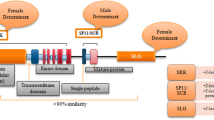Abstract
Self-incompatibility is a phenomenon that involves recognition of self versus non-self pollen, leading to the rejection of self-related pollen and preventing self-fertilization. In this study, we used a baculovirus-infected insect cell culture system to express two Brassica oleracea stigma-specific proteins required for self-incompatibility: the S-locus glycoprotein, a soluble cell wall-localized glycosylated protein, and the S-locus receptor kinase, a receptor-like integral plasma membrane glycoprotein with serine/threonine kinase activity. Insect cells expressing the S-locus receptor kinase were used in conjunction with immunofluorescence and a whole cell enzyme-linked immunosorbant assay to demonstrate that the receptor is targeted to the cell surface and is oriented with its N-terminal S domain towards the outside of the cell.
Similar content being viewed by others
Author information
Authors and Affiliations
Additional information
Received: 20 January 1999 / Revision accepted: 13 April 1999
Rights and permissions
About this article
Cite this article
Letham, D., Blissard, G. & Nasrallah, J. Production and characterization of the Brassica oleracea self-incompatibility locus glycoprotein and receptor kinase in a baculovirus infected insect cell culture system. Sex Plant Reprod 12, 179–187 (1999). https://doi.org/10.1007/s004970050190
Issue Date:
DOI: https://doi.org/10.1007/s004970050190




